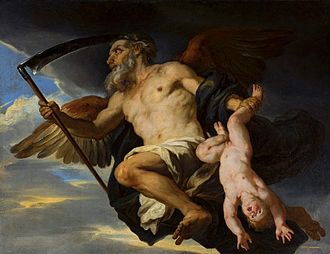Gordon Stewart: “If you love him, why not . . . ?”
Fourth in a series on "Jacob's Ladder at Almost 75"

The time with Tony on Green Street changed my life in ways I could not have expected when the junior high youth group had left Broomall that morning to do a good deed for "the less fortunate" - an act of Christian service, as we would have called it - in north Philadelphia.

Chronos and his Child by Giovanni Francesco Romanelli, National Museum in Warsaw, a 17th century depiction of Titan Cronus as "Father Time," wielding a harvesting scythe
Time is a funny thing. Chronos (clock time) and Kairos (existential time) both happen on the clock but they are not the same.
Chronological time ticks forward, leaving every previous moment behind; Kairos stops time and re-orients the future.
The hours on Green Street are as fresh at the three-quarter century mark as the day they happened.
"If you love him, why not serve him, soldier of the cross?" asks Jacob's Ladder of all who aspire to follow Jesus. If Jesus could stoop down to wash his disciples' feet, surely we could go down to Green Street for a day.
The kids from Marple Church in Broomall left that morning to do just that. We went to serve as a different kind of army, the philanthropic foot-washing soldiers of goodness giving up a Saturday to carry heavy furniture at a ghetto settlement house with other young soldiers of the cross from the inner city African-American Berean Presbyterian Church.
"If you love him, why not serve him?"
We put on our work clothes, travelled to Green Street, and rolled up our sleeves in the strange new world of the Green Street Settlement House.
Although we knew spirituals like "Jacob's Ladder" and "Swing Low, Sweet Chariot," we had little if any idea of their socio-economic-policitical origins or implications. Although we were conscious of their origins in chattel slavery, we were northerners. We knew nothing of W.E. Dubois, and Michael Harrington's The Other America, William Stringfellow's My People Is the Enemy, James Cone's The Spirituals and the Blues and Black Theology and Black Power were years away from being published.
During an afternoon break, the woman who organized the day asked Tony to go home to get something they needed. Perhaps it was a screwdriver. Or maybe a rubber band. It doesn't matter. I went "home" with Tony. "When we get home," said Tony as best I can recall it, "my brother might be there. If he's there, he'll be sitting in the corner. Just ignore him and you'll be okay. He won't like you being there."

Tony's older brother Danny didn't like white people. He had left the church to become a convert to The Nation.
The furthest thing from the mind of the loving servants of Jesus from Broomall was that someone might not like white people. Or that Tony's brother would see Christian "service" as servile - a demeaning attack on black dignity and pride - or see the "soldiers of the cross" as the problem, not the solution. Danny didn't look up during our brief visit to the Lewis's home.
The day with Tony shook my sense of innocence to its foundations. It was a Kairos moment - a deconstruction and reconstruction of faith and consciousness that continues at age 75.
But each person's autobiography is distinct. I didn't realize until this morning how much my memory of the day is a guy's memory of it. I was lifting heavy furniture with a kid named Tony, getting to know each other carrying sofas and chairs from one location to the next. Although neither Tony nor I was big or strong, my diminutive friend Carolyn was smaller . . . and she was a member of the "weaker sex," as it was called by some back then.
Only yesterday did I learn that my dear Broomall friend Carolyn was having anything but a Kairos moment scrubbing a toilet on Chronos time all by herself. Carolyn's email reads as follows:
I had a very strange time. It seemed to them, and I'm sure they were correct, that I couldn't do some of the heavy lifting, so they set me to sandpapering a few layers of awful paint off the toilet seat. I worked hard at it all day, and only got about half done when they remembered I was there and I was embarrassed that in all that time I had not finished my only project. They were very nice about it. But I didn't get a chance to meet any of the Berean folks except the lady who gave me the job.
Reading Carolyn's memory takes me in different directions that change the intent of this reflection: the difference gender, as well as racial privilege, seems to have made scraping multiple layers of paint and who knows what else from a crusty toilet seat, a task that may have been all too familiar to the woman who assigned the job to Carolyn.

Some Chronos moments are Kairos moments, as the day with Tony was for me. Others they are time bent over a toilet seat. The difference is as clear as black and white, poor and rich. How many of the women from Berean rose every morning to put on their maid uniforms to catch the subway and the Red Arrow bus to become invisible, forgotten "soldiers of the cross" in the wealthy homes on the Main Line an hour's ride west of Philadelphia?
